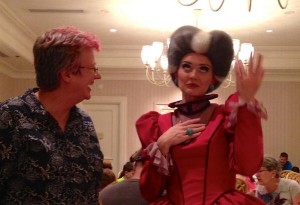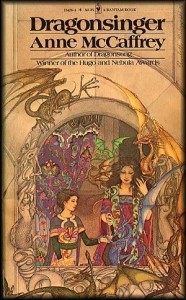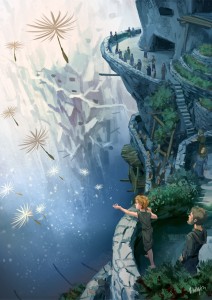

And my answer is yes. Yes, you should. Why?
Because it helps people discover the work that you’re proud of. You know what you wrote. You know what you want to make sure they see. It’s okay to say, “Hey, if you’re looking to read something by me, I would try this.”
Because it helps people read widely. Every writer in F&SF should — well, I don’t want to make it seem mandatory so I won’t say that you must do this, but you should at least feel free to make eligibility posts. So when someone’s poking around, they can find your stuff and read it.
Because you shouldn’t self-censor out of modesty when talking about your work. You are its best champion. Go ahead and help people find the best examples of it. Be humble and lovable in some other way. (Thank you to Erin M. Hartshorn for the link to the piece of self-effacement.)
...
 One of the things I’ve been trying to do in recent years is look more at the history of the field. In the thrift store, I love finding F&SF anthologies from the 60s and 70s, in part because it’s interesting to see which names kept on going, which faded away. Often the most riveting story in a collection is from a writer whose name I’ll only see that once. In reading anthologies, I find that often one of the most revelatory parts is the introduction, less for anything said about the stories than for clues to the publishing climate at the time.
One of the things I’ve been trying to do in recent years is look more at the history of the field. In the thrift store, I love finding F&SF anthologies from the 60s and 70s, in part because it’s interesting to see which names kept on going, which faded away. Often the most riveting story in a collection is from a writer whose name I’ll only see that once. In reading anthologies, I find that often one of the most revelatory parts is the introduction, less for anything said about the stories than for clues to the publishing climate at the time.
Recently in the thrift shop, I picked up a couple of paperbacks: two volumes worth of early Hugo winners, edited by Isaac Asimov. Of course I bought them. How could I not, in light of recent controversies? They’ve been an interesting read – particularly when I’m reading the first Nebula volume at the same time — and sometimes illuminating. If you’d like to read the book I pulled these from, it is More Stories From the Hugo Winners Vol II, published in 1971.
I certainly have realized that despite my admiration for Asimov’s work, the good doctor and I would probably have not gotten along particularly well — at least from my point of view. Every intro to a story seems much more about Asimov than either story or writer, in an egocentric way that seems a little charming but I’m betting was pretty grating to be around at times. (I by no means claim that Asimov is the only SF writer to exhibit this trait.) But Mr. Asimov is not here to defend himself and was very much a product of his time, so I’ll leave it at that.
Because I found it striking, this is taken from his introduction to Anne McCaffrey’s “Weyr Search”. It’s a glimpse into the social mores of that time (the early 70s) that’s interesting. I have refrained from adding any inline commentary. As you read, you may admire my restraint in that.
...

The thing I’m not fond of, which has arisen in recent years, is the idea that one should vote according to one’s politics, and plunk down a vote for the “right” books without bothering to read them. Some people like to justify this by pointing to something that is undeniably true — the award is often less often the expression of the opinion of SF fans overall than that of a small subset of those fans and sometimes — perhaps even often — popularity, access to high-traffic websites, or other factors not related to quality of writing affects those results. In these cases, that’s usually used as a justification for throwing the votes in what’s perceived in the opposite direction.
And my reply is this: FFS, people, read stuff and vote for the stories you like, the stories which YOU find well-crafted and appealing. Go download the excellent Campbell sampler that Marc Blake has been putting together each year and take the time to read through it. Look at the ‘year’s best’ lists. Ask people what they liked that you might. Look at the five kerjillion “here’s what I have eligible this year” posts, particularly if you have a favorite author and want to make sure you don’t miss anything by them.
But read it and apply your standards to it and then vote for what you thought was the best story/novella/whatever. Anyone telling you to vote any other way, anyone offering their work and saying “you should vote for this because we belong to the same category” rather than “I hope you’ll vote for it if you like it” has an agenda that is not at all about quality of writing.
...

It’s rainy season, so it’s Humid and warm, but there’s usually a nice breeze coming in from the ocean. Rainy season doesn’t mean the same thing that it does in Seattle. Here sometimes it’s nice and sunny and then suddenly OMG THERE ARE BUCKETS OF WATER FALLING FROM THE SKY. I kinda like it, myself. And I’m sure it doesn’t hurt me to be forced inside in order to write. 😉
We’re a little outside the main drag, so we’re within walking distance of grocery store, restaurants, etc, but it’s a bit of a slog in this heat. People are friendly if you address them, but it doesn’t feel as though most of them are interested in interacting. (Not that they should, just that it feels a lot less chatty than back in Seattle.) My Spanish is improving in leaps and bounds, though, so I’m feeling pretty comfortable in terms of being able to communicate. We’ve also found they show Big Bang Theory with Spanish subtitles every evening, which is a nice way to supplement the geekier part of my vocababulary.
The vegetation, the birds, etc, are wonderfully new. Lots and lots of flowers, plenty of lizards (in a wide range of sizes), and birds I don’t know, aside from the pair of macaws we saw on our first evening, which seemed a lovely omen. We believe they were getting very friendly with each other — not sure what that does to the omen’s significance.
We can see the hills and mountains, which usually have clouds slumbering on them, lovely vistas that remind me a little of the Blue Mountain greeting cards we used to sell at Waldenbooks, a ragged line trailing into softer fog, but without all the platitudes written underneath.
...

So in that light, if you’re reading for the Hugo, Locus, Nebula, Tiptree, or World Fantasy Award, here you go.
I had twenty original pieces published in 2013. Of those, I’m pushing two, one SF short story and one fantasy story. The first is “Elsewhere, Within, Elsewhen,” which originally appeared in BEYOND THE SUN, edited by Bryan Thomas Schmidt, which I am happy to mail a copy of to people interested in considering it. The fantasy story is “Superhero Art,” which appeared in DAILY SCIENCE FICTION. If you’d like to see the full list of 2013 pieces with links to the online ones, you can find it in my 2013 wrap-up post.
I myself am reading for the Hugo, Locus and Nebula and am not sure yet about WFC. I am also on the Norton jury this year, so if you’ve got a YA or MG novel that came out in 2013, I’m very interested. Feel free to leave pointers in the comments on this piece; I pledge to make sure I read any listed there. If you want to mail me something, please send it in mobi or pdf format.
Enjoy this writing advice and want more content like it? Check out the classes Cat gives via the Rambo Academy for Wayward Writers, which offers both on-demand and live online writing classes for fantasy and science fiction writers from Cat and other authors, including Ann Leckie, Seanan McGuire, Fran Wilde and other talents! All classes include three free slots.
Prefer to opt for weekly interaction, advice, opportunities to ask questions, and access to the Chez Rambo Discord community and critique group? Check out Cat’s Patreon. Or sample her writing here.
...

If you are interested, I’ve got two pieces that I consider my best of the year, and I’m happy to send copies for your consideration. One is “Five Ways to Fall in Love on Planet Porcelain,” a short story which appeared in my collection, NEAR + FAR. I’m still pretty proud of the audience gasps that piece got when I read it at World Fantasy this year. It’s an odd piece, but I like it a lot. The other piece is a novella, A SEED ON THE WIND, which appeared in stand-alone form from Athans Associates.
Other eligible pieces include “Grandmother,” which appeared on Escape Pod, and “Bus Ride to Mars,” which appeared in Daily Science Fiction.
...

Arthur C. Clarke’s “The Star” (winner in 1956) actually violates what I tell my students. It’s the sort of name, an article and common noun, devoid of verb that I would circle on a paper. But it’s such a classic story of its time, shamelessly yanking out every emotional stop, and so it’s pretty easy to see why it was that year’s winner.
Past that, others bear out my thesis. Avram Davidson’s “Or All The Sea With Oysters” (winner in 1958) is a stylish killer of a title, carrying a whiff of Caroll-esque steampunk long before its time. Robert Bloch – “That Hellbound Train” (winner in 1959) (What train, the reader wonders, what is it like, who are its riders?); Anton Lee Baker – “They’ve Been Working On…” (nominee in 1959) (Who are they? What are they working on, and why does the author give us that trailing off, that textual pause of the …?); Alfred Bester – “The Men Who Murdered Mohammed” (nominee in 1959) (Murder’s a sinewy lump of a word that sometimes overpowers the rest of the title, but here it’s effective as can be.); Algis Budrys – “The Edge of the Sea” (nominee in 1959) ( plain language in a poetic construction, which manages to pull it off given that Bester is usually a guarantee of decent quality that will justify it); C.M. Kornbluth – “The Advent on Channel Twelve” and “Theory of Rocketry” (both nominees in 1959) (simple but powerful); and then Fritz Leiber’s audacious and (imo) funny as hell “Rump-Titty-Titty-Tum_Tah-Tee” (nominee in 1959).
...
Want access to a lively community of writers and readers, free writing classes, co-working sessions, special speakers, weekly writing games, random pictures and MORE for as little as $2? Check out Cat’s Patreon campaign.

"(On the writing F&SF workshop) Wanted to crow and say thanks: the first story I wrote after taking your class was my very first sale. Coincidence? nah….thanks so much."

(science fiction, short story) I run a courier ship between Earth, Luna, the space stations, Mars, and the Inner Gate. You need as little mass as possible to run a snipship, and due to what that doctor called my defects, I’m one of the smallest, fastest. Good pay, and most of the time I’m low-g, which is easiest on me.


This site is protected by reCAPTCHA and the Google Privacy Policy and Terms of Service apply. This site is a participant in the Amazon Services LLC Associates Program, an affiliate advertising program designed to provide a means for sites to earn advertising fees by advertising and linking to Amazon.com.